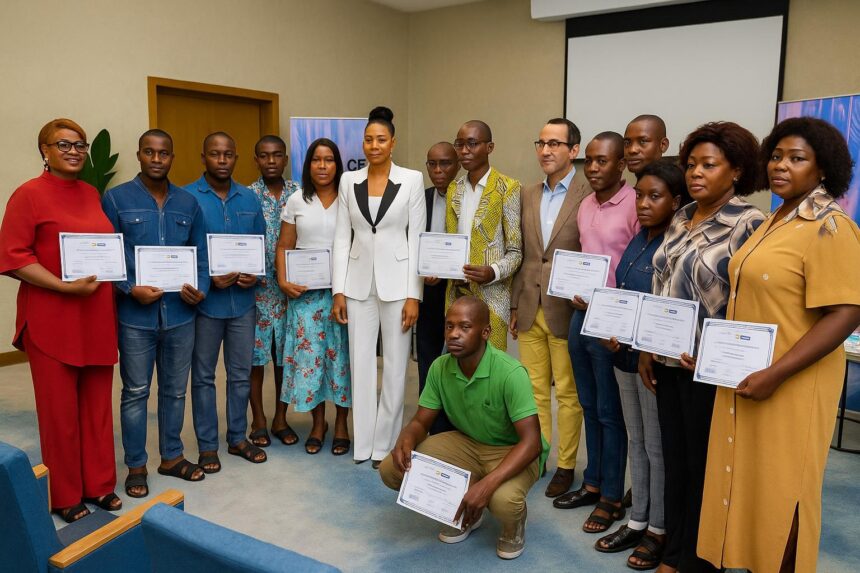Soft-Power Skills at the Heart of Brazzaville
On 11–14 August, the Pupuce Academy Foundation staged its inaugural masterclass in Brazzaville, focusing on art of the table, etiquette and savoir-vivre. The curriculum sought to translate traditional courtesies into marketable soft skills for women aged eighteen and above.
The programme, patronised by Aurélie Makosso, spouse of the Prime Minister, crowned four days of workshops with certificates of participation, signalling institutional recognition of competencies often considered intangible yet decisive in diplomatic, hospitality and entrepreneurial careers.
Marina Mondelé, representing the patron, described the arts of refinement as “the DNA of our living-together”, a phrase echoing Congo’s emphasis on social cohesion contained in the National Development Plan 2022-2026.
Modules blended theory and simulation. Participants rehearsed place-setting protocols, role-played hosting scenarios and reviewed case studies from the African Union diplomatic manual. Trainers emphasised that mastery of micro-gestures—posture, eye contact, timing—can convert courtesy into strategic advantage during negotiations or job interviews.
Public–Private Alignment Behind the Initiative
Pupuce Academy was created by Pucette Sassou N’Guesso to honour the cultural philanthropist Pupuce Ibata Ngalla, former chair of Miss Congo. The foundation operates as a non-profit, drawing on private sponsorship and logistical support from ministries in charge of culture and youth.
Officials stress that such synergies match President Denis Sassou Nguesso’s vision of a society where “every talent finds its runway”, articulated during the Forum for National Youth in 2021. By converging public authority and family philanthropy, the masterclass showcases an emerging governance model.
The office of the Prime Minister facilitated access to the parliamentary reception hall for the final ceremony, symbolically placing the initiative within state architecture. Observers noted the presence of corporate sponsors from telecommunications, banking and aviation sectors, indicating rising private-sector appetite for refined service standards.
Regional and Global Context for Female Empowerment
UNESCO’s 2022 Education Monitoring Report notes that life-skills training boosts women’s employability by up to 20 percent in Central Africa. The African Union’s Agenda 2063 equally lists “civic virtues and respect for African values” among flagship aspirations.
Congo-Brazzaville already ranks above the sub-Saharan average on the UNDP Gender Inequality Index, and the government aims to consolidate that advantage by embedding etiquette modules in vocational centres, according to officials at the Ministry for the Promotion of Women.
In neighbouring Gabon and Cameroon, similar academies have partnered with hotel schools to channel graduates into tourism clusters. Observers view the Brazzaville programme as part of a wider regional trend rather than an isolated gesture.
The 2023 Draft Strategy for National Culture, currently under parliamentary review, proposes introducing elective etiquette courses in secondary schools, citing the masterclass as a pilot. Lawmakers argue that cultivating poise early can reduce school violence and contribute to the broader objective of peaceful citizenship.
Diplomatic Significance of Etiquette Education
Soft-power theorists from Nye to Anholt argue that protocol mastery enlarges a nation’s influence without coercion. Congo’s foreign ministry confirms that junior diplomatic staff will be invited to future sessions to rehearse protocol scenarios alongside civilians.
Congolese chef-de-mission to UNESCO, Dieudonné Moyongo, told this review that “investing in our youth’s comportment reinforces the credibility of every note verbale we dispatch”. The statement underlines the value placed on personal bearing in multilateral arenas.
Embassies in Brazzaville, including those of France and China, sent observers to the August sessions. Diplomats privately welcomed a pipeline of graduates versed in cross-cultural courtesy, which could ease bilateral events and trade delegations.
Professor Serge Kiala of Marien Ngouabi University points out that etiquette classes function as ‘social capital accelerators’. His forthcoming study on soft power in Francophone Africa highlights a correlation between protocol literacy and increased female representation in mid-level management across public institutions.
Sustainable Prospects for Congo’s Youth
Pupuce Academy plans to expand its curriculum to entrepreneurship, digital literacy and public speaking over the next three years, financed in part by a proposed partnership with the UN Population Fund, currently under negotiation.
Organisers are also in talks with local banks to offer micro-grants to alumnae who launch event-planning or protocol consulting start-ups, an idea aligned with the government’s National Programme for Economic Diversification.
Analysts caution that outcome measurement will be essential. The foundation intends to publish annual tracer studies tracking employment trajectories and social impact, a step consistent with OECD evaluation guidelines.
Challenges persist. Urban connectivity gaps and transport costs can limit attendance for young women outside Brazzaville. The foundation is exploring weekend satellite sessions in Pointe-Noire and Oyo, along with an e-learning component compatible with low-bandwidth devices, reflecting the government’s digital inclusion agenda.
Stakeholders agree: refined manners refine prospects, positioning youth development as a lever of nation branding.






















